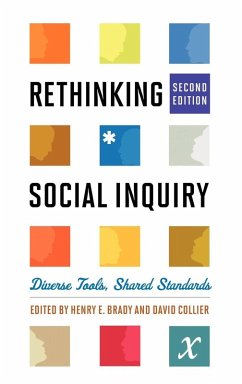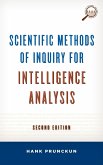With innovative new chapters on process tracing, regression analysis, and natural experiments, the second edition of Rethinking Social Inquiry further extends the reach of this path-breaking book. The original debate with King, Keohane, and Verba-now updated-remains central to the volume, and the new material illuminates evolving discussions of essential methodological tools. Thus, process tracing is often invoked as fundamental to qualitative analysis, but is rarely applied with precision. Pitfalls of regression analysis are sometimes noted, but often are inadequately examined. And the complex assumptions and trade-offs of natural experiments are poorly understood. The second edition extends the methodological horizon through exploring these critical tools. A distinctive feature of this edition is the online placement of four chapters from the prior edition, all focused on the dialogue with King, Keohane, and Verba.
Hinweis: Dieser Artikel kann nur an eine deutsche Lieferadresse ausgeliefert werden.
Hinweis: Dieser Artikel kann nur an eine deutsche Lieferadresse ausgeliefert werden.
Praise for the Second Edition: The new edition of Rethinking Social Inquiry is, quite simply, the best treatise yet on the intersection of qualitative and quantitative methods. The book places causal-process tracing on a new foundation and provides a framework for skeptically evaluating natural experiments. The discussions are conceptually, statistically, and historically rigorous; the examples will have broad appeal. -- Daniel Carpenter Harvard University I love this book and its pragmatic, ecumenical message. In an era where deep, if artificial, methodological divisions unnecessarily hamstring social research, this book is especially timely. Written by some of the most skilled and innovative methodologists in political science, the individual essays are consistently excellent. But it is the larger message about the need for methodological breadth and variety that will make the book such a valuable teaching tool. -- Douglas McAdam, director, Center for Advanced Study in the Behavioral Sciences, Stanford University Praise for the First Edition: Rethinking Social Inquiry is a breakthrough book. It powerfully makes the case for social inquiry as a rigorous quest for valid causal inference that must exploit to the full the insights and strengths of both statistical and case-based methods. Brady and Collier and their fellow contributors show the pitfalls of mechanically applying dogmas from 'quantitative' or 'qualitative' extremes. Shared standards are possible; and researchers using diverse research designs can work together to build illuminating, empirically grounded theories. All political scientists-indeed all social scientists-should read and reflect on this compelling set of arguments. -- Theda Skocpol, Harvard University Praise for the First Edition: King, Keohane, and Verba's Designing Social Inquiry aimed at incorporating qualitative research methods into the conceptual framework of quantitative methodology. But was the attempt successful? What is the relationship between qualitative and quantitative methods? In this volume, Brady, Collier, and several other prominent social scientists address these questions in powerful essays. Everyone interested in research methods, and certainly everyone teaching the subject, will want to read this book. -- Christopher H. Achen, Princeton University Praise for the First Edition: [This] book serves a threefold purpose: it gives an excellent brief overview of the fundamentals of quantitative research, including a critique; it describes in detail tools for qualitative research; it gives a perspective o how to use both to maximize research results. Forum: Qualitative Social Research The authors display a sophisticated understanding of the diverse strengths and pitfalls of quantitative and qualitative methods of inference within the context of a common commitment to the idea that political science is a scientific enterprise. The essays in this collection ought to be on the reading list of the introductory methods course that all graduate programs offer. -- Michael Wallerstein, Yale University The first edition of Rethinking Social Inquiry was a game changing contribution that decisively moved the methodological discussion into a post-KKV era. This second edition is the new cutting edge. It retains the key insights from the previous version while advancing major new methodological tools, both qualitative and quantitative. No social scientist can afford to be without this book. -- James Mahoney, Northwestern University The revised and reorganized edition of this foundational book expertly draws out the complementarities of quantitative and qualitative methods, including an updated debate with King, Keohane, and Verba. New chapters and online exercises yield novel insights into the rigorous use of process tracing and greatly enhance the book's utility and value. -- Diana Kapiszewski, University of California, Irvine








